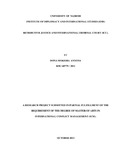| dc.description.abstract | Conflict, and with special reference to armed conflict, has shaped the course of world
history, and has prompted the intervention of measures to create peace. Conflicts in the
21st century are going to look very different from those of the century before. This paper
looks at the possibility that by its application of the principle of retributive justice, the
ICC has positively affected intra- and inter-state conflicts, and thereby, achieved one of
its auxiliary objectives; a higher objective, which is to prevent the war form taking place,
and not to wait for it to happen, to met out justice to the belligerents who did not play
according to the rules of the game. Out of this analysis, the paper identifies gaps and
lacuna that need be filled through policy shifts, and treaty amendments, or jurisprudential
interpretation of already existent laws to advance the cause of rule of law and protect the
court, and the idea that it presents, the idea that some crimes are so grave, that despite the
nationality of the perpetrator must be tried. The hypothesis under consideration proposes
that the current model of dispensing criminal justice by ICC, which applies retributive
justice, is having a positive, preventive effect in commission of international crimes. The
study finds that the restitutive model of conflict resolution is more individual focused,
alienating the community, and focusing on punishing the offender, with less focus on the
victim. On the other hand, the restorative model is focused towards long term
sustainability of peace, through addressing the community, and the victim, as well as the
offender. It is hence more wholesome an approach to conflict resolution. ICC’s conflict
resolution model is retributive, as opposed to restorative, or reparative. The paper
recommends that ICC takes the model of restitutive, reparative or restorative justice, as
opposed to retributive justice. | en |

